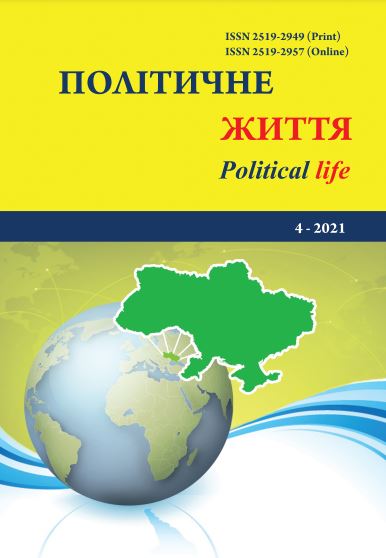The role of the leader’s personality in resolving crisis situations in the country
DOI:
https://doi.org/10.31558/2519-2949.2021.4.4Keywords:
political communication; political leadership; power; crisis situation; leader ‘s personalityAbstract
The article analyzes the specifics and problematic aspects of the formation and course of various crisis situations and the role of personal qualities of political leaders in the strategy of their solution, which is a very relevant research topic in modern political science and political practice. It is in the analysis of the influence of personal qualities of a political leader on the resolution of crisis situations in the country are the purpose and relevant objectives of the article.
Research methods such as the policy analysis method, statistical method, functional comparison method, decision making method and content analysis were used.
The key features of crisis situations, their types and impact on the policy sphere are identified. The basic principles of political leadership, the qualities of a leader and the importance of decisions made by him are determined. On the example of the analysis of the activities of political leaders of the two countries during one crisis, the main strategies of interaction of political leaders with the electorate and current political elites and their impact on overcoming the crisis. It is substantiated that the image and personality of a political leader influences not only the perception and support of the electorate and the apparatus of power, but also the longevity of this support under the influence of the crisis situation.
As a result, it is shown that the political leader either continues to follow the chosen strategy, or gives up his strategy and in search of support “fusses» and makes a number of unreasonable decisions, of course, and the results of such activities are strikingly different.This is confirmed by the political events in Germany and Greece, where two completely different personalities of political leaders initiated a number of important political changes and processes of global importance during the euro crisis.
It is concluded that the personality of a political leader is a key source of change in the country during a crisis situation. It is the activities and decisions of the political leader that determine the strategy of overcoming the crisis and further transformations in the country
References
Атаманчук Г., Гірник А. Політичний менеджмент. Теорія і практика політтехнологій. Рівне: Перспективи, 2005. 222 с.
Вебер М. Харизматическое господство. Социологические исследования. 2009. № 3. С. 139-147
Гринстайн Ф. Личность и политика. Социально-политические науки. 2011. № 10. С. 67-74
Демократическое правовое государство и гражданское общество в странах Центральной и Восточной Европы. Москва, 2005. 184 с.
Кармазіна М. С. Криза політична. Політична енциклопедія. Київ. Парламентське видавництво. 2011. С. 373–374
Ковалевський В. Політична комунікація як інструмент подолання кризових явищ. 2015. URL: http://periodicals.karazin.ua/politology/article/view/3218
Лозинський О. М. Політична психологія. Львів. 2021. 228 с.
Ольшанский Д. В., Пеньков В. Ф. Политический консалтинг. Санкт-Петербург. 2015. С. 122–124.
Онуфрик Я. Б. Психологічні технології виборчої кампанії: настрої суспільства, політичний імідж, чорний піар, маніпуляція свідомістю. Чернівці. 2013. 87 с.
Рудич Ф. М. Порівняльна політологія: Навч. посіб. Київ. 2006. 321 с.
Хрестоматия по политической психологии / сост. и науч. ред. Шестопал Е. Б. Москва. 2012. 344 с.
Чекменёва Т. Г. Политические кризисы: понятие и типология, 2016.. URL: http://vadimgalkin.ru/politics/policy/politicheskie-krizisy-ponyatie-i-tipologiy
Foy H., and K. Hope. Greeks Dance but Tsipras Faces Big Test. Financial Times, July 7. 2015. URL: https://next.ft.com/.
Haslam S. A., Reicher S. D., Platow M. J. The New Psychology of Leadership: Identity, Influence and Power. London: Psychology Press, 2011
Hope K. Somersaulting Tsipras Prepares Next Trick. Financial Times, 2015. August 22.
Nardelli A. Angela Merkel: 10 Years in 10 Charts. The Guardian, 2015. September 18. URL: http://www.theguardian.com/news/datablog/2015/sep/18/angela-merkel-10-years-germany-chancelloreconomy-cdu.
Schoeller M. G. Providing Political Leadership? Three Case Studies on Germany’s Ambiguous Role in the Eurozone Crisis. Journal of European Public Policy, 2016. № 24 (1): Р. 1–20.
The German Mentality: Hail, the Swabian Housewife, 2014. February. URL: http://www.economist.com/news/europe/21595503-views-economics-euro-and-much-else-draw-culturalarchetype-hail-swabian.
Tsebelis G. Lessons from the Greek Crisis. Journal of European Public Policy, 2016. № 23 (1). С. 25–41.
Van Esch F. A. W. J. The paradoxes of legitimate EU leadership. An analysis of the multi-level leadership of Angela Merkel and Alexis Tsipras during the euro crisis. URL: https://www.tandfonline.com/doi/full/10.1080/07036337.2016.1277716.

